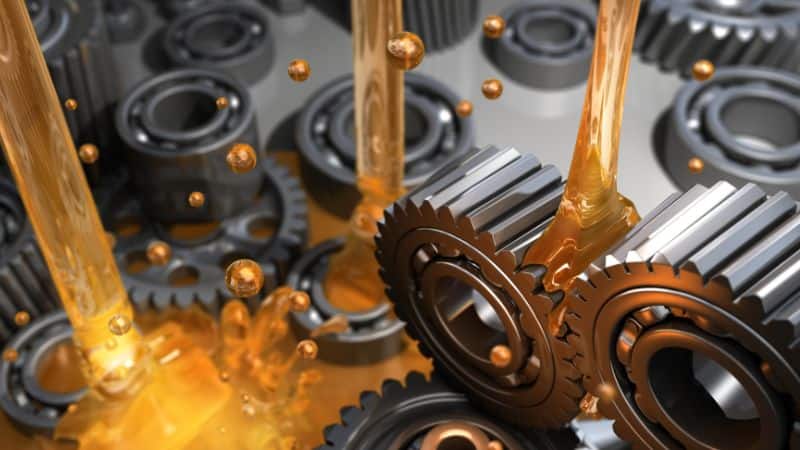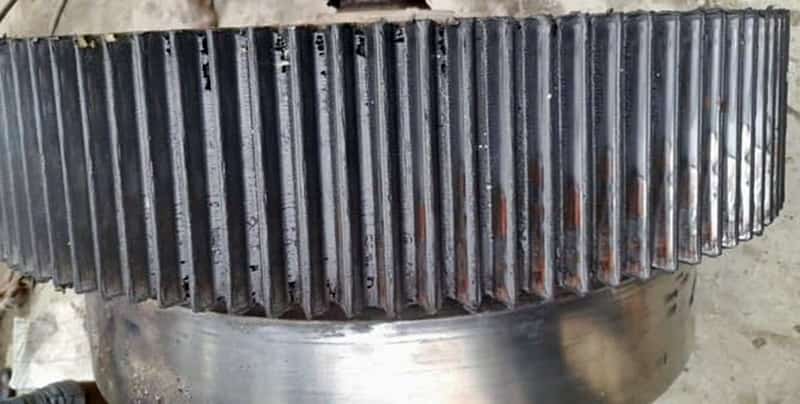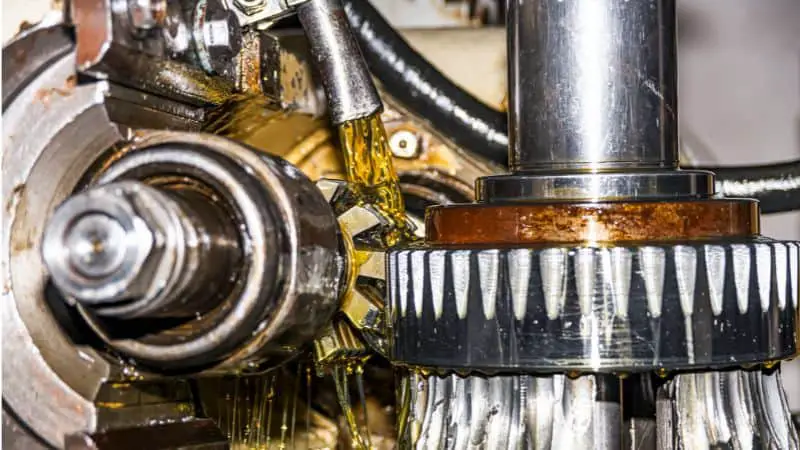Industrial Gear Oil
Industrial Gear Oil is made up of highly refined base stocks that have been fortified with specially selected extreme pressure and other additives. These oils, whether used in heavy industrial machinery or shafts, allow gears to move smoothly by preventing surface friction from wearing them down.
They have good thermal stability and high oxidation resistance, as well as good reusability and a low foaming tendency, and they protect metal surfaces from rust and corrosion.
Industrial Gear Oil is recommended for heavy-duty enclosed gear drives with splash and circulation systems, as well as plain bearings, sliding surfaces, and chain drives subjected to high shock loads in environments where temperatures do not exceed 100°C.

Types Of Gear Oil
Gear oils, like most specialized oils, contain a wide range of additives that are designed to handle a variety of situations. Many additives have disadvantages, which means that using the correct additive formulated for a specific operation is critical. Below is the list of different types of gear oil:
Related: Can You Mix Gearbox Oil?
Rust and oxidation gear oil
Rust and oxidation gear oil are formulated to reduce corrosion within the gearbox in which they are used. They are classified as ISO grades 32-320. The majority of gear oils will provide some level of rust and oxidation protection; it’s one of the best ways to protect the gearbox and extend the life of a gearbox.
Rust protection prevents gears and other machinery from corroding as the oil flows through the system, as well as providing some protection from moisture that may enter the machinery.
Oxidation protection prevents microscopic debris that inevitably separates the gears from oxidizing within the oil, thereby extending the useful life.
Extreme pressure gear oils
Extreme-pressure gear oils are engineered to withstand much higher levels of heat and pressure than other types. This naturally implies a lot of additives, which can be dangerous if you’re not careful about the type of machine they’re put in.
The majority of these agents are based on chlorine or sulfur, which can be hazardous to certain metals. Exposure, for example, can soften the surface of bronze gears, which are commonly used in worm drives.
As a result, they should only be used when specified by the manufacturer. Other anti-wear additives, such as zinc-based protectants are desirable for applications containing metals that are easily affected by chlorine or sulfur.
Compound gear oils
The viscosity of a gear oil can be increased significantly by combining it with fatty oils. When combined with the appropriate additives, the result is an oil that is suitable for low-speed, high-pressure applications while maintaining high lubricity. These are mainly compound gear oils & frequently used in high-pressure industrial or automotive gear applications.
Synthetic gear oils
Synthetic gear oils are more of a niche product than synthetic motor oil, which is highly desirable. These oils, made from poly alpha olefin and additives are primarily used for extreme machine conditions.
Whether the temperatures are extremely low or extremely high, synthetic gear oils are the best choice when other oils simply will not function. They are manufactured in a wide range of viscosities, with ISO grades 32 to 6800 available. They’re also beneficial in high-pressure situations.

What Is The Best Gear Oil?
When it comes to selecting oils or lubricants for industrial gear, there are numerous factors to consider. Some of these factors include viscosity, additives, and base oil type. The more informed you are about making the right selection, the better decisions you can make when selecting gear oil. Without further ado, let’s go over to the selection criteria!
There are three important factors to consider when selecting gear oil. They are:
Viscosity
Viscosity is an important parameter to consider when selecting gear oil. There are various grades, and the key is to select the appropriate viscosity grade. First and foremost, learn about the manufacturer’s requirements, which can be found in the operating manual or on the manufacturer’s website. There are several viscosity grades available, and the choice is also determined by the operating conditions.
Additive Selection
The additives used in gear oil indicate whether the oil is extreme pressure or non-extreme pressure, which also depends on operating conditions. The basic additive is another factor that must be considered after selecting the viscosity grade of the oil. While there are many variations, gear lubricants can generally be placed into two categories:
- Rust & Oxidation
- Extreme Pressure
This stands for rust and oxidation, as well as extreme pressure. Extreme pressure additives are not present in rust and oxidation-inhibited (R&O) gear oils. Chemical stability, reusability, corrosion prevention, and foam suppression are all areas where R&O gear oils excel. These products were created for use in gearing that operates at relatively high speeds with low loads and uniform loading. Under high pressure and high-temperature lubrication conditions, they do not perform well or prevent wear.
Some of the performance capabilities of extreme pressure gear oils outperform those of R&O oils. EP lubricants contain special additives that improve their film strength or load-carrying ability in addition to the properties listed for R&O lubricants.
Sulfur phosphorous is the most common EP additive. These are chemically active compounds that change the chemistry of machine surfaces to prevent wear due to friction under high load conditions.
Base Oil Selection
The operating conditions and gear type must determine whether a mineral or synthetic base oil is used.
Most applications benefit from high-quality mineral-based oils. Mineral-based oils typically have higher pressure-viscosity coefficients than common synthetics, allowing for greater film thickness at a given operating viscosity. However, there are times when synthetic base oils are preferable.
Many synthetic base oils are more resistant to oxidation and thermal degradation, making them ideal for high-temperature applications and, in some cases, allowing for longer service intervals. Furthermore, because of their high viscosity index and low pour points, synthetics perform better in machines subjected to low temperatures.
Because of the high viscosity index, synthetic products can be used in a wider range of temperatures, eliminating the need for seasonal oil changes. Some synthetics may also provide more lubricity, reducing friction on sliding surfaces.
Difference Between 220 And 320 Industrial Gear Oil
| Oil Type | 220 Gear Oil | 320 Gear Oil |
| Description | 220 gear oil is a high-performance oil designed specifically for shock load conditions. This oil provides superior wear protection in extreme conditions. 220 gear oil meets the requirements of a major steel company and has fine is oxidation-resistant and thermally degraded. | 320 gear oil is a high-performance oil designed specifically for heavy shock load conditions and operations in harsh environments. This oil provides superior wear protection in extreme conditions and has a Timken load performance of 290N. 320 gear oil meets the requirements of a major steel company and is oxidation-resistant and thermally degraded. |
| Applications | 220 gear oil is ideal for use in harsh industrial gearboxes such as wind turbines, paper, and steel mills, cement and mining, plastic extrusion and injection, aerators and agitators, and the chemical process industry. | 320 gear oil is ideal for heavily-loaded and shock-loaded industrial gearboxes operating in harsh environments. steel, cement, and mining industries. It can also be used to repair damaged, worn, or misaligned gear transmissions. |
| Limitations | Mineral oils and poly alpha olefins have low compatibility. 220 has a lower viscosity than 320, that’s why this oil has some limitations than 320 gear oil. | 320 gear oil is not recommended for industrial gears operating at temperatures above 100°C. In cases of high operating temperatures. |

Is Any Gear Oil Equivalent To 220?
ISO 220 gear oil is an industrial gear oil with a KV@40oC of 220 cSt +/- 10% (i.e., 198 – 242 cSt). It’s North American equivalent is AGMA 5 R&O gear oil, or AGMA 5EP Extreme Pressure gear oil. Most modern SAE 90 gear industrial oil misses the KV@40oC by a small margin, but it is close enough; you need it equivalent to SAE 110 gear oil, which is not available in almost all markets. You cannot use automotive SAE 75W90, which has a KV@40oC of 100-105 cSt, which is equivalent to ISO 100 industrial gear oil and is two viscosity grades thinner than ISO 220.
| Rust and Oxide Inhibited Gear oils | Viscosity Range | Equivalent ISO Grade | Extreme Pressure Gear Lubricant |
| AGMA Lubricant No. | cSt(mm2/s) at 40oc | AGMA Lubricant No. | |
| 1 | 41.4 to 50.6 | 46 | |
| 2 | 61.2 to 74.8 | 68 | 2EP |
| 3 | 90 to 110 | 100 | 3 EP |
| 4 | 135 to 165 | 150 | 4 EP |
| 5 | 198 to 242 | 220 | 5 EP |
Viscosity Ranges for AGMA Lubricant Numbers
If you must use an industrial gear oil due to a lack of availability or a high price, consider an 85W140 with a KV@40oC closer to 242 cSt.
FAQs:
Q. What gear oil is for industrial gearbox?
Durability is an important factor to consider when purchasing an industrial gearbox oil. Gearbox oils must be long-lasting in order to provide consistent performance over extended periods of time. Along with that, there is high reusability, allowing gearboxes to be easily dried and cleaned.
The right kind of oil additives in the right amount is required for the lubricants to support the gearbox in extreme pressure conditions. The right additive combination in gear lube improves performance and maximizes efficiency.
Q. How to change gear oil in Ford Industrial 545?
Before checking the gear oil, park the tractor on a level surface and turn off the engine. Remove the small gauge (dipstick) under the driver’s seat and clean it with a cloth. Reinstall and remove the gauge, tilting it to check the oil level.
Gently refill the oil into the engine if it is running low. Always have the gear oil changed before or after the first 600 hours.
Q. What is industrial gear oil?
Industrial Gear Oil is a high-quality, heavy-duty, extreme-pressure (EP) industrial gear oil designed for lubricating heavily loaded enclosed gear drives operating in moderate to severe service conditions. It is designed to keep industrial gears running smoothly and protect equipment investments by extending life, reducing downtime, increasing productivity, and lowering maintenance costs.
Q. Which oil is used in the industrial gearbox?
Industrial gearboxes are expected to perform under high heat and heavy loads, as well as in environments that are frequently contaminated with dirt, process debris, and water. Gears and bearings will wear prematurely if not adequately protected. For enclosed industrial gearbox applications such as high-speed drives, high-speed rotating equipment, turbines, and centrifugal compressors, industrial gearbox oil must be specially formulated with high viscosity, additives, and good base oil to combat high-temperature conditions.
Check:
